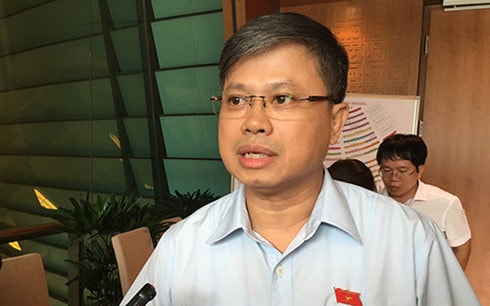Many pressing problems are actually caused by officials and civil servants.
"Arrogant, authoritarian, impolite, irresponsible officials and civil servants... cause resentment in society."
The Prime Minister has just issued Directive 26 on strengthening discipline and order in state administrative agencies at all levels, in which it is especially forbidden to use alcohol and beer during working hours and lunch breaks of working days and on-duty days; requiring resolute handling of violations, harassment and inconvenience in handling work of people and businesses as well as strictly implementing regulations on ethics and communication culture of cadres, civil servants and public employees...
National Assembly Delegate Nguyen Sy Cuong - Vice Chairman of the National Assembly's Foreign Affairs Committee said that Directive 26 was issued at the right time. However, in order for the Directive to truly come into effect and be effective, it is necessary to organize practical implementation and strictly handle violations to set an example, not just to make slogans.
 |
| National Assembly Delegate Nguyen Sy Cuong - Deputy Chairman of the National Assembly's Foreign Affairs Committee. |
The weakest point is the attitude of responsibility.
PV:What is the significance of the Prime Minister's issuance of Directive 26 in the current situation of civil servants, sir?
Delegate Nguyen Sy Cuong: I think that Directive 26 was issued at the right time. Previously, many ministries, branches and localities issued similar rectification regulations, but the Prime Minister's Directive demonstrates the Prime Minister's consistent viewpoint in building an honest and active Government. The issuance of this Directive is national-wide and sets higher requirements.
The administrative apparatus itself cannot do anything, but whether it is good or not, whether it can be changed or not depends on the actions of the staff and civil servants. Correcting the attitude, style and working manner of the staff and civil servants will help the apparatus operate better and more effectively.
PV:The fact that the Prime Minister's Directive mentions many specific behaviors that need to be corrected and strictly prohibited reflects the people's urgent reality about the attitude and responsibility of a number of cadres and civil servants?
Delegate Nguyen Sy Cuong:Talking about evaluating the team of civil servants, I strongly agree with the assessment of General Secretary Nguyen Phu Trong at the Conference to deploy the Action Program to implement the Resolution of the 12th National Party Congress and the directives and conclusions of the Politburo and Secretariat on mass mobilization work held last May.
That is, many party members have an attitude of contempt for the people, not listening to the opinions of the masses. Some cadres, civil servants, and employees who have direct relations with the people are authoritarian, arrogant, harassing, causing all kinds of trouble and difficulties for the people, lacking in courtesy to the people; some even embezzle money from the people, extort gifts and bribes. Some people with positions of power maintain a mandarin and patriarchal style, being in charge of a locality or unit like a "little king" there.
I think the General Secretary's comments are very comprehensive.
Moreover, in reality today, I see the irresponsible attitude of officials and civil servants as the biggest weakness. No matter how highly qualified or talented you are, if your attitude and awareness are poor, it will not make the apparatus work better.
In my opinion, some civil servants will jump into any good work that is beneficial to them, but will procrastinate and push difficult work onto others.
In that situation, having specific regulations such as Directive 26 to require changes is very necessary.
 |
| Officers of the Vinh City Land Use Rights Registration Office perform duties at the One-Stop Transaction Center. |
PV:You once said at the National Assembly forum that many hot and urgent issues also come from the civil servants and public employees. Is it possible that the cause also comes from a weak attitude towards responsibility, sir?
Delegate Nguyen Sy Cuong:Many of the hot and pressing issues raised are actually caused by civil servants. They are arrogant, authoritarian, lack courtesy towards the people, and lack responsibility, causing resentment in society. Therefore, if we just discipline the civil servants, the problem will be solved.
"The boss sits in the room blowing smoke, who can he say anything to?"
PV:If the leader sets an example and strictly implements, there is no reason why the attitude and responsibility of civil servants cannot be corrected and the situation improved?
Delegate Nguyen Sy Cuong:I completely agree with that opinion. Because in any agency or organization, the leader always has a great influence.
For example, smoking in the office, when discussing the Law on Prevention of Tobacco Harms, I once said in the National Assembly: if the boss just sits in the room smoking, he cannot speak to anyone, not to the officials and civil servants.
The same goes for other similar matters. If the leader works seriously and has a good sense of responsibility, the civil servants will look at him as an example and follow suit. If the leader is not a good example, the civil servants under his authority will of course be affected immediately.
PV:Besides regulations, do you think there should be strong sanctions and strict discipline for violations so that the implementation of the Directive can be truly effective in practice?
Delegate Nguyen Sy Cuong:All regulations in Directive 26 are clear, specific and many have already been stipulated in the law on cadres, civil servants and public employees.
For example, not performing assigned tasks without a valid reason, violating labor discipline regulations; having an arrogant attitude, causing difficulties and troubles to agencies, organizations, units, and individuals in the performance of official duties... are behaviors described in the disciplinary forms in Decree 34/2011/ND-CP on disciplinary actions against civil servants. That is, if you violate those regulations, you will be punished, but you have not done it thoroughly for a long time. Or violating regulations on smoking is also regulated in the Law on Prevention of Tobacco Harms.
Now, any missing behaviors should be added to the legal regulations, for example, the prohibition of drinking alcohol during working hours. Complete the regulations so that civil servants can base on them and strictly implement them, avoiding formalities. In reality, many things that the masses pay attention to and follow, they see that there are things that we just say and shout about but do not strictly implement. That is what the public is most concerned about.
Those issues are now being monitored by the people, and organizations and National Assembly deputies are also participating in monitoring. When violations are discovered, they need to be considered and handled strictly to build trust.
PV:Directive 26 will also be the basis for the National Assembly to supervise the implementation of policies and laws on reforming the State administrative apparatus, sir.?
Delegate Nguyen Sy Cuong:That thematic supervision of the National Assembly will take place in 2017, but from now on, the implementation of Directive 26 will help to rectify, then the National Assembly will conduct supervision, then there will certainly be certain changes. I think the Directive will help the National Assembly's supervision have more basis.
After monitoring based on the general situation of the State apparatus' operations through the monitoring results, the National Assembly will have certain recommendations, thereby helping to reform the administrative apparatus so that it is truly effective and efficient.
According to VOV
